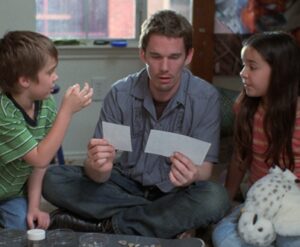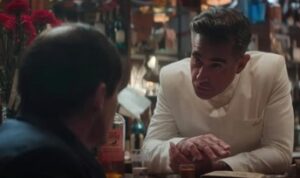Blue Moon
 For my money, the best film so far this millennium has been Richard Linklater’s 2014 drama “Boyhood.” This was the one that was filmed over an eleven-year period, so that the four primary characters aged in real time. The father was played by Ethan Hawke, who was just coming off a Best Supporting Actor nomination for “Training Day” when filming on “Boyhood” first began. As the absent, divorced father, one would assume Hawke’s character would be the type to shower the kids with gifts when he shows up for his all-too-infrequent visits. And at first, that’s exactly what we get. But as “Boyhood” progresses and the mother bounces from one ill-fated relationship to another, Hawke’s character emerges as the stable and influential parent. Although Patricia Arquette won a Best Actress Oscar, Hawke’s performance was the glue that held “Boyhood” together.
For my money, the best film so far this millennium has been Richard Linklater’s 2014 drama “Boyhood.” This was the one that was filmed over an eleven-year period, so that the four primary characters aged in real time. The father was played by Ethan Hawke, who was just coming off a Best Supporting Actor nomination for “Training Day” when filming on “Boyhood” first began. As the absent, divorced father, one would assume Hawke’s character would be the type to shower the kids with gifts when he shows up for his all-too-infrequent visits. And at first, that’s exactly what we get. But as “Boyhood” progresses and the mother bounces from one ill-fated relationship to another, Hawke’s character emerges as the stable and influential parent. Although Patricia Arquette won a Best Actress Oscar, Hawke’s performance was the glue that held “Boyhood” together.
Since “Boyhood,” Hawke has taken on more challenging roles, often in independent films, like “Maudie,” in which he played the abusive husband to Sally Hawkins’ portrayal of Canadian artist Maud Lewis. Hawke also scored a winner as the embittered Congregationalist minister in Paul Schrader’s eerie drama “First Reformed.”
New career best?
But now Hawke turns in perhaps the best performance of his entire career in “Blue Moon,” his latest pairing with director Richard Linklater. And this one couldn’t be more different from “Boyhood.” Instead of the vast, sweeping palette of an entire life – at least from birth through the end of high school – “Blue Moon” takes place in one night, and is an examination of just one character.
Lorenz Hart
Hawke plays famed lyricist Lorenz Hart, the original songwriting partner of Richard Rodgers (played here by Andrew Scott). In 1942, Rodgers unceremoniously dumped Hart in favor of lyricist Oscar Hammerstein, with whom he would go on to produce some of the most famous and beloved Broadway musicals of all time. It doesn’t take us long to see why Rodgers has made the replacement. Hart is depicted as an insufferable drunk, and a chatterbox who expects others to listen to his constant spew of musings on life, Broadway shows, and anything else that might pop into his head.
 One setting
One setting
Although not based on a play, “Blue Moon” would certainly work well on stage. All the action in Robert Kaplow’s original screenplay takes place inside the bar at Sardi’s, an actual restaurant located in the Theatre District of Manhattan. Character actor Bobby Cannavale plays Eddie, the bartender who grows increasingly impatient with Hart as he continues to beg for additional drinks. Eddie is your standard movie bartender, although (perhaps given the setting) he does seem to know more about theatre than most.
Newcomer Jonah Lees plays the piano player, whom Hart nicknames “Knuckles.” Knuckles is on furlough from WWII, and provides yet another ear for Hart’s ramblings. Knuckles occasionally breaks out a song he knows Hart will recognize – creatively using this technique to redirect Hart’s focus when he starts to make other patrons uncomfortable.
E.B. White
British actor Patrick Kennedy turns in a nice cameo as the young author E.B. White, working on a new novel, which would become “Stuart Little.” Hart recognizes White, and draws him into his ongoing train-of-thought musings – thereby giving Eddie and Knuckles some breathing room. White provides more of an intellectual equal than Eddie, whose primary concern seems to be sex. White and Hart connect on everything from war to the power of words to beautiful women.
The beautiful young lady
Which brings us to Hart’s primary concentration for the evening – save for his jealousy of the rousing success of “Oklahoma!” on its opening night. The 47-year-old Hart is apparently infatuated with a beautiful 20-year-old Yale student named Elizabeth, who has previously joined Hart for drinks and conversation in his Manhattan apartment. Risky move on her part? Yes. But, as an aspiring singer-actress, her end game is to meet Richard Rodgers – a fact which gnaws at Hart to no end. She does, however, appreciate Hart’s work, and (unlike most of the others that night at Sardi’s) wants to hear him tell about it.
 She’s played by Margaret Qualley, in yet another outstanding supporting performance. When we first meet her, we are led to believe Hart – who occasionally drops hints that he may be a closeted homosexual – is simply infatuated with her beauty and her interest in him. But Elizabeth turns out to be a strong-willed, intelligent young woman, who has her sites set on a career in musical theatre.
She’s played by Margaret Qualley, in yet another outstanding supporting performance. When we first meet her, we are led to believe Hart – who occasionally drops hints that he may be a closeted homosexual – is simply infatuated with her beauty and her interest in him. But Elizabeth turns out to be a strong-willed, intelligent young woman, who has her sites set on a career in musical theatre.
Seething rage
Hart has planted himself at the end of the bar knowing that Elizabeth will make an appearance. What we later learn is that Sardi’s is to be the location of the cast party following the opening night of “Oklahoma!” Given his jealousy, this would be a particularly bad place for Hart to plant himself for the evening. And as “Blue Moon” progresses, Hart’s inner rage seethes. Fortunately, Kaplow and Linklater are smart enough not to give Hart what we might call an “Oscar scene,” in which he angrily confronts Rodgers and/or Hammerstein. Such a scene might be an audience pleaser, but would seem out of place in this film, which is rooted in reality.
Hawke plays Hart so well and so accurately, we feel his pain. As the paparazzi and other well-wishers surround Rodgers and Hammerstein, Hart slinks off in the background, knocking down whiskey shots like they’re going out of style. When Hart gushes praise on both Rodgers and Hammerstein, we sense the very real agony Hart clutches in his soul. This night is torture for him, and why he insists on subjecting himself to it is beyond us – although in his deepest and wildest imagination, he believes he may just stand a chance to become Elizabeth’s love interest.
Brilliant performance
It’s a tortured and aching portrait of a man whose best work is behind him, thanks to his own life choices. Because of this, “Blue Moon” is not often easy to watch. But Ethan Hawke is absolutely brilliant. The film itself is minor in comparison to “Boyhood,” but then what isn’t? “Blue Moon” is a tour de force for one of our greatest actors. And unlike Nicholas Cage, who went on to star in a series of big-budget mainstream fare following his Oscar-winning turn in “Leaving Las Vegas,” Hawke has stretched his acting chops since “Boyhood.” “Blue Moon” is (so far, at least) the pinnacle of his great career.
Andy Ray‘s reviews also appear on https://townepost.com/tag/film-reviews/